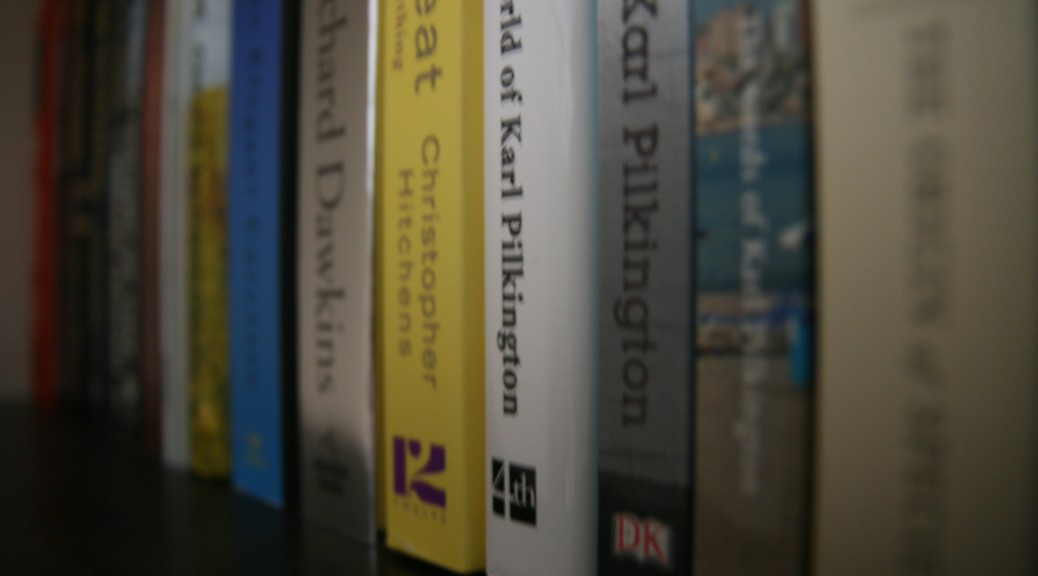The next step will be finding a comfortable storage space for your books. Here are some helpful tips to keep in mind for secure storage before you construct or purchase shelves, bookcases, crates, cabinets, etc. That way you can plan ahead, and find a safe place to store your collection, with room to grow.
- Store your books correctly. Don’t stack books horizontally on one another because it causes stress on the spines and hinges of the books. Keep your books in a straight, balanced, vertical line on your bookshelf. Uneven stress can ruin a book. Find a nice balance of having the books comfortably organized in a tight, secure row. Too loose and they will lean, causing damage to the boards and bindings; but too tight and the covers can rub together, causing the spines of the books to warp. Making sure the bottom of the book is evenly distributed on it’s resting surface, with no extra pressure or stress on one end, is a good way to distinguish between a book resting evenly or loosely.
- Shelving books of the same size together can help with keeping them straight and even. Constant discrepancies in book sizes across a shelf can cause the covers of larger books to warp.
- Use bookends
when the shelf is not full. This will help keep your books nice and straight, and they offer a wide variety of designs and colors, so they can add more to the collection than just support.
- Use a book stand
or a book cradle
when displaying fragile or rare editions of your collection.
- Sunlight will bleach and yellow dust jackets and/or covers. It is very important to avoid light, especially direct sunlight, as much as possible when storing your books. If you can’t keep your bookcases/shelves out of direct sunlight, cover your books with a piece of blackout cloth during daylight hours or use book jacket covers with UV light protection. You can even go the length of installing UV light filters on lights and windows around your books. Even light sources other than natural light can cause light damage. Turn off direct light sources, such as table lamps, light fixtures, touch lights, or any light source that shines directly on your collection. Even the lights heat can contribute to the deterioration of your books, if left on long enough.
- Do whatever you can to keep your books stored away from fire/heat sources, such as fireplaces, stoves, heaters, air vents, etc. Fire can obviously destroy your books, but heat can warp the books covers and dry out the leather bindings as well. Smoke can ruin your books also, and not just from the sources mentioned above. Keep cigarettes, incense, candles, or any other source that produces smoke away from your storage space.
- Keep all liquids away from your book collection. These stains are often difficult, if not impossible, to fix. High humidity, which is the amount of moisture in the air, can also cause severe damage to your collection. The humidity level in your storage space should never be consistently above 60%. If so, control the storage spaces climate immediately, or find a new place to keep your collection. Your books will benefit with a constant, comfortable temperature. Places such as a garage or storage shed, without climate control, aren’t recommended for storing books due to fluctuating temperatures, not to mention insects and other elements.
- Mentioning insects, it is important to prevent them from migrating into your storage space. Books contain materials that attract insects, such as glue, starches and gelatin. Bookworms will eat the glue, as well as the pages and the leather binding. Deter insects away from your book collection as much as possible. Small containers of boric acid powder
near your collection may help with insects. If you suspect an infestation in your collection, put your affected books in the freezer for two days, covered in plastic wrap or an air tight, dry plastic bag, which will freeze and kill the larvae. Let the larvae dry out for a day or two, then gently brush them out of your books. Look for holes in the pages of the books, small piles of dust, or accumulations of dead insects for signs of an infestation.
- Dust and clean your books often. Once a month is a nice balance. This will help prevent dust, dirt, and residue from building up. Use a soft lint-free cloth
to dust the spine, corners, covers and the tops and bottoms of the pages. Make sure to clean and dust your storage space before even setting up your books.
- Don’t wet your finger to turn the pages because the saliva will cause harm to the paper.
- Marking your place by leaving a book open face up or face down, can cause damage to the spine.
- Open old and rare books carefully. Do not open them fully and especially don’t force them open. If a book is large and heavy, place it on a flat, hard surface before opening it or you may crack the spine due to the uneven pressure.
- Remove books from any shelf by gripping the spine at the middle of the book on both sides, instead of pulling at the top of the spine. Pushing in the neighboring books on both sides is a good way to get a secure grip on the book you’re removing.
- Cotton, antistatic, and nylon gloves will help protect from the transfer of dirt and oil while handling your archival materials, and are also recommended during book repair.
- Your leather bound books will actually benefit from the occasional handling without gloves because the natural oil in your skin will help keep the leather limber.
- A pH testing pen
can help indicate if an item is alkaline or acidic.
